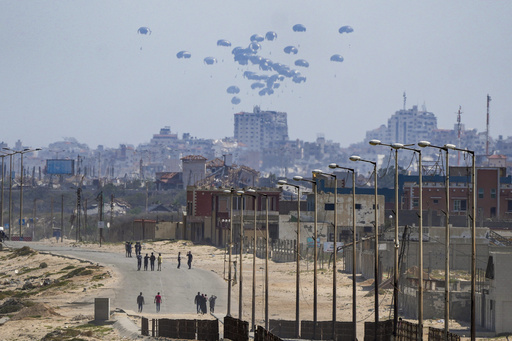
UNITED NATIONS — On Wednesday, a senior U.N. humanitarian official accused Israel of hindering vital aid deliveries to Gaza, prompting the U.S. ambassador to urge more decisive action from the Israeli government amid an escalating humanitarian crisis. The remarks were made during an urgent session of the U.N. Security Council, convened to address the severe humanitarian issues particularly affecting northern Gaza.
Joyce Msuya, the acting humanitarian chief, alongside U.S. Ambassador Linda Thomas-Greenfield, intensified calls on Israel to change course during the meeting. This convening followed a warning from the U.S. to Israel, asserting that it must significantly increase its efforts to deliver aid or face consequences regarding military funding. The Biden administration has provided a timeline of 30 days for Israel to implement measures such as allowing 350 trucks of essential supplies to enter Gaza daily.
In defense of Israel’s actions, U.N. Ambassador Danny Danon stated that his country’s humanitarian initiatives are extensive and criticized the Security Council for its focus on Gaza while Israeli citizens face daily threats from those seeking to harm them. He highlighted that Israel had dispatched over 1 million tons of aid, encompassing 700,000 tons of food, since initiating military operations after Hamas’s unexpected attack on October 7, 2023.
Danon contended that the international community was overlooking the core issue—Hamas’s alleged diversion of aid intended for Palestinians, creating significant barriers to ensuring that assistance reaches those in need. He reaffirmed Israel’s commitment to collaborating with partners to facilitate the delivery of aid, even in challenging circumstances.
Joyce Msuya portrayed a dire situation in northern Gaza, relaying that food supplies are extremely low due to ongoing military actions. She revealed that no food was delivered to the northern region from October 2 to October 15, except for a minimal amount, and that without additional fuel, most bakeries would likely have to shut down shortly.
Msuya further indicated that throughout Gaza, less than one-third of the 286 humanitarian operations coordinated with Israeli entities in the first half of October proceeded without significant obstacles or delays. She expressed concern that as Israeli airstrikes persist, the humanitarian conditions are deteriorating daily, with essential supplies being consistently obstructed.
Riyad Mansour, the Palestinian U.N. ambassador, condemned the Israeli military campaign, asserting that it is subjecting 400,000 Palestinians in northern Gaza to a state of siege and starvation, which he labeled as crimes against humanity. He described the situation as genocide, calling for immediate intervention to halt such actions.
U.S. Ambassador Thomas-Greenfield acknowledged some commitments from Israel following the U.S. statement, including the entry of two dozen aid trucks into northern Gaza after several weeks of delays. However, she labeled these efforts as inadequate and emphasized the need for Israel to fulfill commitments such as opening additional border crossings and securing the delivery routes from armed groups that threaten the transport of humanitarian supplies.
The U.S. ambassador cautioned against a “policy of starvation” in northern Gaza, highlighting its severe legal implications under both international and U.S. law. She reiterated that Israel has claimed this is not its policy, insisting that essential supplies will not be curtailed, and stressed the need for action to align this stance with practical efforts on the ground.
During the session, multiple council members called for urgent measures from the U.N.’s leadership to address the ongoing conflict in Gaza. Guyana’s U.N. Ambassador Rodrigues Birkett expressed frustration over the lack of effective results despite numerous Security Council meetings and binding resolutions advocating for a ceasefire over the past year.
She noted, “We must not allow the unraveling of the moral and legal foundations that support our organization,” emphasizing the pressing question before the council about how to address the escalating crisis. Thomas-Greenfield urged all council members to back the U.N. in its endeavor to enhance aid deliveries, affirming that the U.S. priorities for the upcoming months will focus on increasing humanitarian assistance, securing the release of hostages, and striving for an end to the ongoing conflict.
